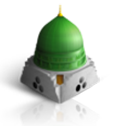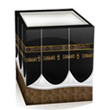To See The Prophet (sallAllaahu `alayhi wa sallam) In One's Dreams
- Details
- Category: Sheikh Bin Baz
- Published on Wednesday, 06 November 2013 12:15
- Hits: 812
To See The Prophet (sallAllaahu `alayhi wa sallam) In One's Dreams
Question:
What is the correctness of the Hadeeth reported from the Prophet (sallAllaahu `alayhi wa sallam) ãä ÑÂäí ÝÞÏ ÑÃì ÇáÍÞ "Whoever sees me (in his dream), then he has in fact seen me" And another Hadeeth that says: ãä ÑÂäí ÝÞÏ ÍÑãÊ Úáíå ÇáäÇÑ "Whoever sees me (in his dream), then the Fire is forbidden for him." What do they signify?
Answer:
The first Hadeeth, in which the Prophet (sallAllaahu `alayhi wa sallam) said:
ãä ÑÂäí ÝÞÏ ÑÃì ÇáÍÞ
"Whoever sees me (in his dream), then he has in fact seen me." (Al-Bukhari no. 6996 and Muslim no. 2267)
- is authentic, and there are various wordings for it, in one narration:
ãä ÑÂäí Ýí ÇáãäÇã ÝÞÏ ÑÂäí ÝÅä ÇáÔíØÇä áÇ íÊãËá Ýí ÕæÑÊí
"Whoever sees me in his sleep, then he has indeed seen me, for the Shaytan cannot impersonate me in my appearance." (Al-Bukhari no. 110)
And in another:
ãä ÑÂäí Ýí ÇáãäÇã ÝÞÏ ÑÃì ÇáÍÞ Çä ÇáÔíØÇä áÇ íÊÔÈå Èí
"Whoever sees me in his sleep, then he has in fact seen me, for the Shaytan cannot impersonate me in my appearance." (Ahmad 2/261)
There are many different wordings for this Hadeeth, and each one confirms that the Shaytan, the enemy of Allaah, cannot take on the Prophet's appearance, and so when a person has a dream about the Prophet (sallAllaahu `alayhi wa sallam), he has truly seen him in the dream.
The Prophet's appearance is well-known among scholars: He was of medium height, handsome, with a reddish complexion and a thick black beard; however, later on in his life, a few of his hairs turned white.
As for the second Hadeeth -
ãä ÑÂäí ÝÞÏ ÍÑãÊ Úáíå ÇáäÇÑ
"Whoever sees me (in his dream), then the Fire is forbidden for him."
- it has no basis and is not authentic.
Shaykh `Abdul-`Azeez Bin Baz
Fatawa Islamiyah, Vol. 7, Pages 174-175, DARUSSALAM





















